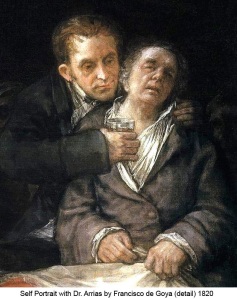Although we tend to discuss the condition of dementia in relation to ageing, We seem to talk less about another ‘d’ word, dependency. Dependency is and always has been Dad’s worst nightmare. Either because of upbringing or natural tendency, he has instinctively fought for independence; materially, socially, psychologically and physically. My mother struggled with this trait, though she would admit that she had benefited from the material aspect, as did his children. His friends marvelled at his determination and, especially in later life, his resilient attitude. In short, I would say that Dad has always preferred to act rather than wait – and to do rather than be.
 Admirable though this is in some ways, there are downfalls with what we might call an over-independent approach to life. It can breed a conservative and risk-averse frame of mind and also nurture an insular or socially unaware proclivity. For Dad, I would say that his independent persona has also made him more physically active and less talkative than many people – or vice-versa. Critically, it has also meant that the dependence that comes with great old age is doubly hard to adapt to.
Admirable though this is in some ways, there are downfalls with what we might call an over-independent approach to life. It can breed a conservative and risk-averse frame of mind and also nurture an insular or socially unaware proclivity. For Dad, I would say that his independent persona has also made him more physically active and less talkative than many people – or vice-versa. Critically, it has also meant that the dependence that comes with great old age is doubly hard to adapt to.
Ironically, in the care sector there is much talk of independence, as if it could ward off the clear state of dependency that besets residents in  care homes. Sometimes talk of independence is actually a cover for poor care – at its worst, a type of neglect. It seems to me that you can only exercise independence if you have the right conditions to do so and these are not easy to achieve in a care home.
care homes. Sometimes talk of independence is actually a cover for poor care – at its worst, a type of neglect. It seems to me that you can only exercise independence if you have the right conditions to do so and these are not easy to achieve in a care home.
In Dad’s case, those conditions are now very hard to effect. He finds it almost impossible to accept that his mobility is so limited and this means that he falls over frequently. I recall that when I used to visit him in his last flat, if I asked him where to find something, his default response was to get onto his feet and find it himself. ‘No’, I often yelled, ‘just tell me’ but that was much harder and counter-intuitive to him. So probably not much has changed.
However, with limited mobility pressing upon him, Dad is now forced to try harder to use words to explain what is wrong, what he wants and what he means. He can’t jump to his feet and go out when and where he pleases to fetch the things he needs. Explaining things is a challenge, though, and a few months ago I wrote down one of Dad’s attempts to explain what he was looking for: John Lewis – long thing – all singing, all dancing (answer: TV Remote control). Similar effort went into describing underpants as trousers, shorts.
 I realise that this is beginning to sound like a parlour game – something like 20 questions – but in reality it creates a huge amount of frustration on both sides. Mostly, as the scope of his world shrinks further, I can anticipate what Dad might mean – I’ve heard it before and repetition is a reliable guide. However for the large group of ever-changing carers, this type of individualised interpretation is quite a lot to expect.
I realise that this is beginning to sound like a parlour game – something like 20 questions – but in reality it creates a huge amount of frustration on both sides. Mostly, as the scope of his world shrinks further, I can anticipate what Dad might mean – I’ve heard it before and repetition is a reliable guide. However for the large group of ever-changing carers, this type of individualised interpretation is quite a lot to expect.
And not only might the carers struggle to comprehend Dad’s meaning – my brothers at the end of phone lines also find it hard to decipher. This has become even more challenging recently, as Dad’s voice has almost disappeared to a whispered squeak on occasion. I joked last week that this might be because he’s been shouting too much but unfortunately there’s a grim truth to this. Greater dependency also requires that you know how to summon help. There are buzzers in the rooms but their use also presupposes some foresight and ability.
So, greater dependency demands greater skill from carers, in order to interpret requests but also to support the agency of the cared for. Agency  is a word we like to use in debates about democracy and participation – it means having influence on what happens to us and affecting our environments. It is broader than the concept of independence and linked to the world around us. Dad desires agency but sees only that he is losing control. There’s a lot of people trying to help him but that’s not the same – if help means dependence it’s a tricky condition, as far as he is concerned.
is a word we like to use in debates about democracy and participation – it means having influence on what happens to us and affecting our environments. It is broader than the concept of independence and linked to the world around us. Dad desires agency but sees only that he is losing control. There’s a lot of people trying to help him but that’s not the same – if help means dependence it’s a tricky condition, as far as he is concerned.
Language is especially powerful when mobility is lacking but language is not just words. There are other ways in which people can communicate and be understood. Working with young children, I learnt that ‘reading’ and interpreting behaviours was vital. It comes back to the importance of active listening. I can’t help wondering if this is part of the training and education offered for carers of the elderly. We can’t give Dad back his independence but perhaps by acknowledging his agency, we can help him to accept the inevitability of greater dependence.
Images Featured image: Dependency networks, optimice.com.au; 1st embedded image: More than luxury or style, a car means independence by Jennifer Bonanno, blog.morethanwheels.info; 2nd embedded image: Goya’s physician and the art of caring, image posted by JM Levine, jmlevinemd.com; 3rd embedded image: Words by Mason Ashley, masonashley.com; 4th embedded image: The fallacy of the democratisation of influence by Danny Brown, linkedin.com.




